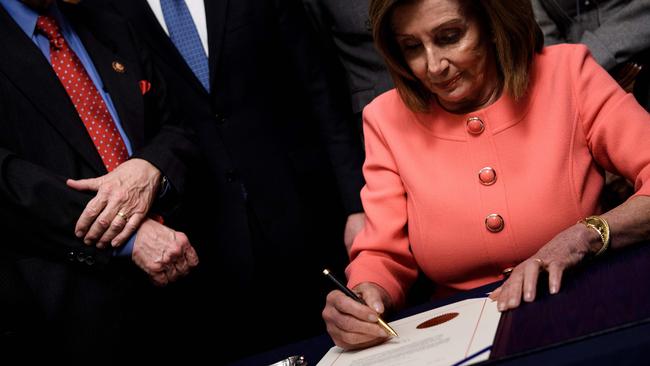Rival views of political power set for a joust

The impeachment trial of Donald Trump in the Senate is at heart a clash of world views and of operative theories about the nature of political power.
The House of Representatives’ brief has a straightforward argument: Trump abused his power and obstructed congress, and was impeached on those grounds. “The impeachment power,” it argues, “is an essential check” on presidential authority, “and congress must exercise this power when the president places his personal and political interests above those of the nation. President Trump has done exactly that.”
The brief alleges that Trump abused his power by exerting pressure on a foreign country to interfere in a US election for his own personal political benefit, thus undermining America’s electoral process and its foreign policy. He wanted Ukrainian President Volodymyr Zelensky to announce an investigation into Joe Biden, and the Ukrainian energy firm on whose board his son Hunter sat, and into allegations that Ukraine interfered in the 2016 election. The brief argues that “there is no evidence that vice-president Biden acted improperly”, and the Ukrainian-interference theory is “not only pure fiction, but malign Russian propaganda”. He sought those investigations, the Democrats say, “for personal and political reasons rather than legitimate foreign policy reasons”.
Trump then obstructed congress by directing the White House and other agencies to flout lawful subpoenas. He directed his top aides not to testify, and compelled multiple agencies to refuse to produce lawfully requested documents. “Refusing to comply with a congressional impeachment investigation,” the house argues, “is not a constitutionally valid decision for a president to make,” and “presents a serious danger to our constitutional checks and balances”.
The brief, filed by Trump’s team in response, argues that the Democrats’ articles of impeachment are “an affront to the constitution and to our democratic institutions”. In this view, impeaching the president for what Democrats say is an abuse of power is actually a dangerous encroachment on the president’s constitutional powers; approving impeachment on those grounds would permanently weaken the presidency. What they call obstruction of congress is a legitimate assertion of presidential power and privilege; approving that article would turn America’s tripartite system of power-sharing into “precisely the type of parliamentary system the Framers rejected”.
Moreover, impeachment, Trump’s team argues, requires “specific offences against ‘already known and established law’ ” and Democrats have provided none. (As it happens, the Government Accountability Office last week found withholding military aid to Ukraine did violate federal law, but this finding was not part of the impeachment articles.)
The Trump team’s view is at odds with Alexander Hamilton’s understanding of impeachment as expressed in the Federalist Papers, written to promote passage of the constitution. In the 65th paper, he argues that “the subjects of its jurisdiction are those offences which proceed from the misconduct of public men, or, in other words, from the abuse or violation of some public trust. They are of a nature which may with peculiar propriety be denominated political, as they relate chiefly to injuries done immediately to the society itself.” The house judiciary committee approved an abuse-of-power impeachment article against Richard Nixon, and Andrew Johnson was impeached for, among other things, “declar(ing) with a loud voice, certain intemperate, inflammatory and scandalous harangues”.
The brief also faults Democrats for failing to present witnesses with first-hand knowledge of why Trump withheld military aid to Ukraine in exchange for announcing investigations into the Bidens, though in fact the White House blocked all such potential witnesses from testifying. It argues the house’s proceedings denied Trump his due-process rights, and it insists his actions regarding Ukraine were legitimate because presidents control foreign policy, regardless of their motives; whereas Democrats possessed “an insatiable partisan desire to find some way to remove him from office”, which fatally taints the impeachment proceeding. In other words, though Democrats’ motives are material and determining, the president’s are irrelevant.
Republicans are not wrong to raise separation-of-power concerns when congress mulls removing a president from office. It is not something to undertake lightly. But impeachment is a constitutionally valid procedure, and it does not, as some Republicans assert, negate the 2016 vote.
If Trump were removed, a Republican (Mike Pence) would still be president; all of his judicial appointees would remain in office; and the policies of a Pence administration would not be substantively different from those of Trump’s.
Removal, of course, is vanishingly unlikely; the 20 Republican senators whose votes would be needed are not going to cross the aisle. Even so, although a congress that made overzealous use of its power to impeach and remove presidents would up-end America’s constitution, it is hard to see why this impeachment and removal, on the specific grounds outlined in the articles of impeachment, would do lasting damage to separation of powers.
It might render future presidents less likely to solicit foreign aid in undermining a domestic political rival. That does not seem like an outcome to mourn.


